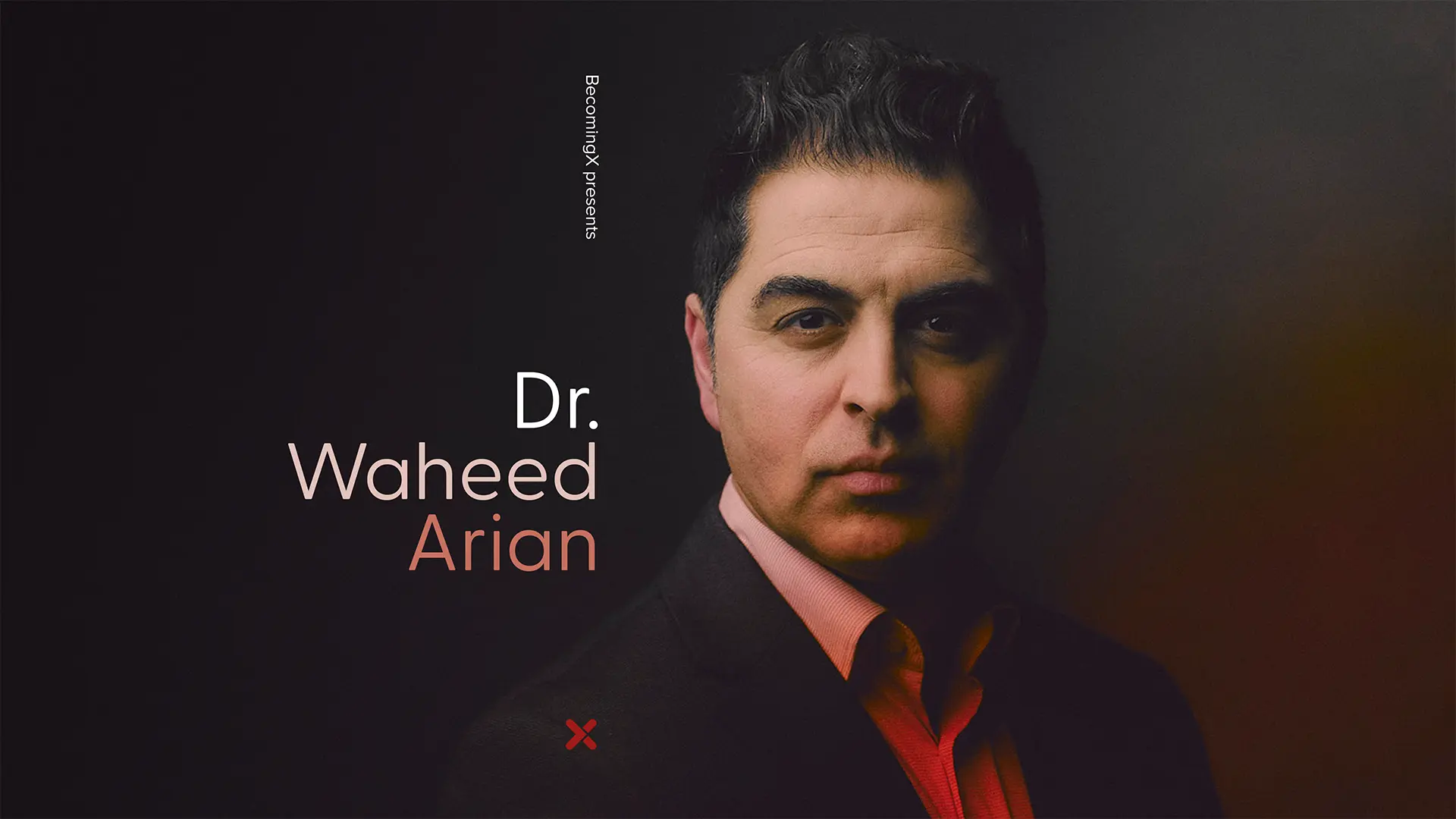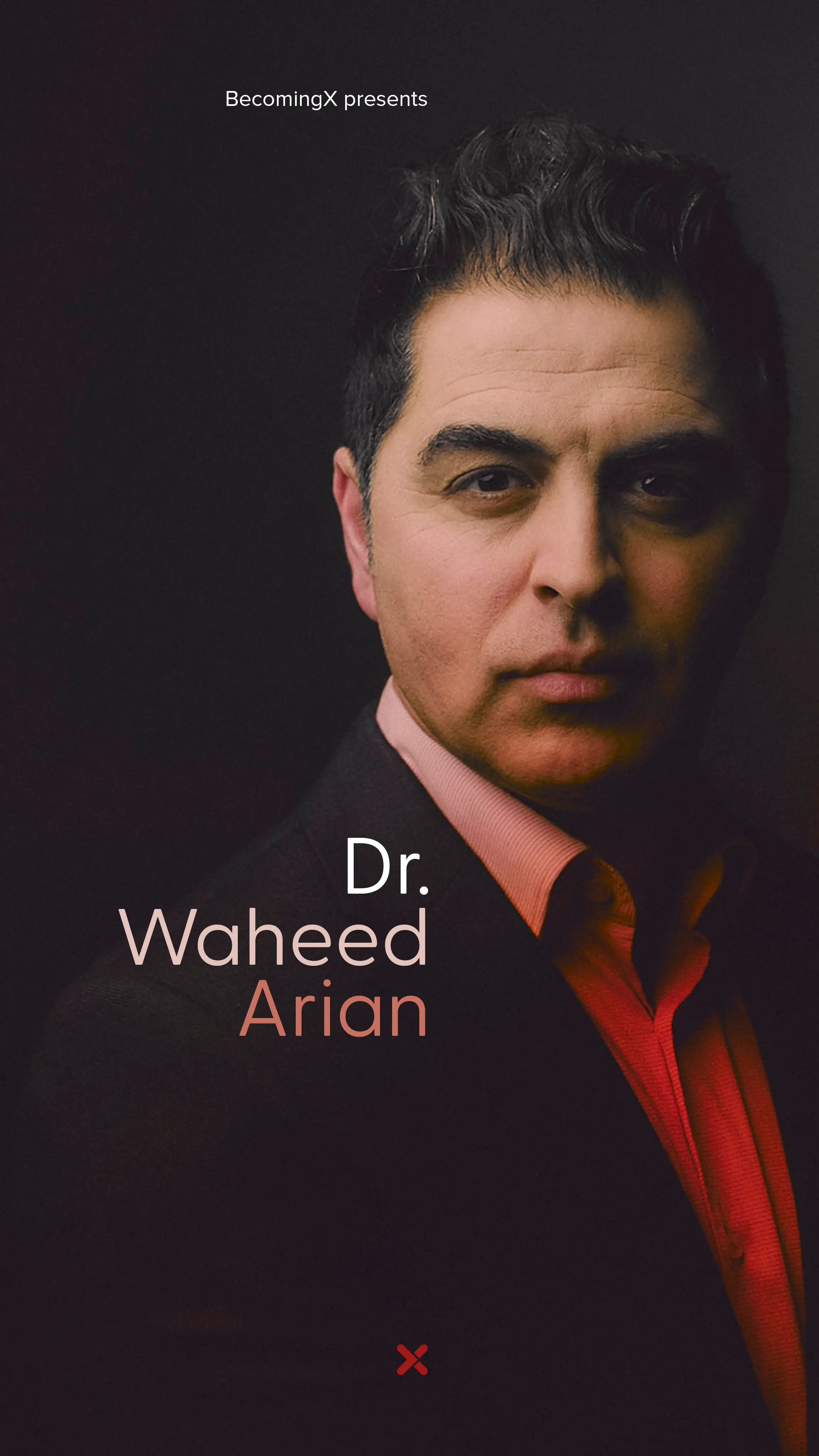

Waheed Arian’s journey from a childhood surrounded by war to becoming a pioneering figure in global health is nothing short of inspirational.
Born in Kabul, Afghanistan, in 1983, Waheed's early years were marked by the Soviet conflict. His family fled to Pakistan, hoping to find safety at a refugee camp. But the journey itself was treacherous and Waheed and his family were nearly killed during an air attack. His father lifted him into an oven in the floor, sheltering him. Miraculously the pair survived.
Having made it to the refugee camp it was whilst living here that Waheed himself got very sick. Tuberculosis was threatening to claim his life, but it was also at this dark time that his curiosity for medicine was born. He saw first-hand the power it held and was inspired to want to become a doctor.
At age 15 he was smuggled to the UK by his parents in the hope of a brighter future. Arrested and imprisoned on arrival for using a fake passport, he was alone in a new country with very little money, and yet still determined to succeed. Waheed’s perseverance paid off as he excelled academically, studying long hours, and eventually earning a place at the University of Cambridge to study medicine.
Never did he let the idea of what could go wrong deter him. Never did he let others comments on what they deemed he could, or could not, achieve sway him from the path he was determined to follow. He found out the necessary steps he had to take, and he faced them head on, one by one.
In 2015, Waheed founded Teleheal, a charity that leverages telemedicine to provide remote medical expertise to doctors in conflict zones and low-resource settings. Volunteer doctors from around the world offer real-time medical advice via digital tools, significantly improving patient outcomes in some of the world’s most challenging environments.
Over the years Waheed has gained international recognition for his work, earning numerous awards, including the UNESCO Global Hero Award and the Rotary International Peace Award. But his focus remains on helping others. He recognises potential in everyone, no matter what their circumstances, and wishes simply for people to help each other. To help, to inspire, and to support.
Waheed Arian – video transcript
For me, when I go into a therapy room, I try to go back into my childhood. The closets that I open, the rooms that I go into. And some are so frightening, some are so lovely.
I was born in Kabul, Afghanistan in 1983. And, the situation I was born into was an Afghan Soviet conflict. So aged five when we couldn't be together as a family because my father had to flee from the military service. He didn't want to fight his fellow Afghans that they were fighting amongst each other. And the only way for us, was to move to Pakistan. It's a very dangerous route. So the journey was usually taken at nighttime, so we were not spotted by the spy planes.
It was early morning, and the men wanted to approach a nearby village to see if there was a room or a few rooms for everybody to settle in to sleep. And I insisted that I would come with my father. He took me with him. We were walking along in the field, I still remember very well. And then suddenly after about five or six minutes, he grabbed me in his arm and he ran towards the village. He found one room that there was an oven in the floor. He took me straight into that oven and he said "Son, if anything happened to me, you'll be responsible for your family". That's the moment that I actually lost my childhood. And within minutes, the jets arrived, the helicopter gunships arrived and the bullets started raining on us. And the only two people that came out of that rubble was me and my father.
We made it to Pakistan. It started in a tent, one of the many tents, a row of tents for millions of refugees in one of the camps in Pakistan. Within three months, I started coughing. I was coughing to the extent that after a few days I would bring up blood. And that's when my parents got very concerned. The next day my father took me to a specialist in Khyber Bazar in Peshawar, Pakistan. He weighed me and then he asked my father to get an X-ray of my chest. After a few minutes, a copy of the inside of my body parts was printed, and I was looking at it, absolutely amazed. I think that's where my curiosity for medicine was born.
The doctor told my father that I had tuberculosis and it was so advanced that I had higher chance of dying if it was not treated soon. And my father burst out crying. And he said "just don't tell me that my son is going to die. Tell me what I can do to save him." I put my head down on him and I could see that his tears were dropping on me, but I, I can't imagine what he went through. You know, I'm a father now, and if there's something wrong with our child, my two beautiful children, I would run, do anything for them. And I think that's also where I learned, you know, the power of humanity. The power of how strong a human can be despite delicate situations in life, despite the traumas, the strength, it's unbelievable.
My parents sold the house, all their belongings, the gold to get the money, to put it into the hands of the people smuggler, who ultimately got me from Pakistan to the UK. At that time, we didn't know that he was a smuggler. He, he told us that he would buy us the visa, a refugee visa to one of the countries. I arrived here in the UK and I was sadly arrested. I was put in Feltham because of the passport that I had carried with me. And after staying for about two weeks in Feltham prison, I was released.
I had no family support, hardly any education. And I had only a hundred dollars in my pocket. But what I brought with me was that so much determination that all my life I wanted to study. And suddenly I found the opportunity to start over there. So I immediately started working, in a perfumes shop, souvenir shop. I rocked up to King's College in London to the admissions office. And I asked the admissions officer, "I want to become a doctor". And all I had to do was get GCSE English and get 'A's at A level. That's it. I don't think about all the reasons why it would not work. So I kept working during the day, studying at nighttime. And even when I told my tutors that I wanted to apply to Cambridge University, and they said, "you're burning one of your options and you'll be lucky to get to any medical school". And I said, "you know what? If I've survived the war in Afghanistan, I'm not going to be put off by Cambridge University. Let's try". And I'm so glad I tried because I got in, I got to Cambridge University and I started medicine in 2003.
What motivates me that every morning when I wake up is that I sometimes transport my mind back straight to, to the refugee camp where I was living. Later in life, I went to a similar refugee camp and I saw a young girl and I had a moment when I was looking into her eyes, you know, my whole childhood flashed in front of me. And it makes me think that there are vulnerable children, 450 million children of war who can do so much good in the world, but they do need a helping hand the same way as I received it. They, they need a key to unlock their potential. They need some way of, somebody telling them that, you know what, "one day you will become a lawyer. One day you'll be a taxi driver. One day you'll be supporting your children". And I would like other people to take on that legacy ultimately, where we can all inspire each other, support each other, and help each other. And that's the legacy that I want to leave.
END CARD
Waheed Arian became an emergency medical doctor after escaping Afghanistan as a refugee.
After spending his childhood fleeing conflict and living in refugee camps, he was smuggled into the UK aged 15 with $100 and a dream of practicing medicine.
Since arriving in 1999, he graduated from Cambridge University, became a doctor, founded a medical charity supporting doctors in warzones, published a best-selling book, and was awarded the UNESCO Global Hero Award.
He continues to work in emergency care, saving lives and giving others the same hope that once saved him.